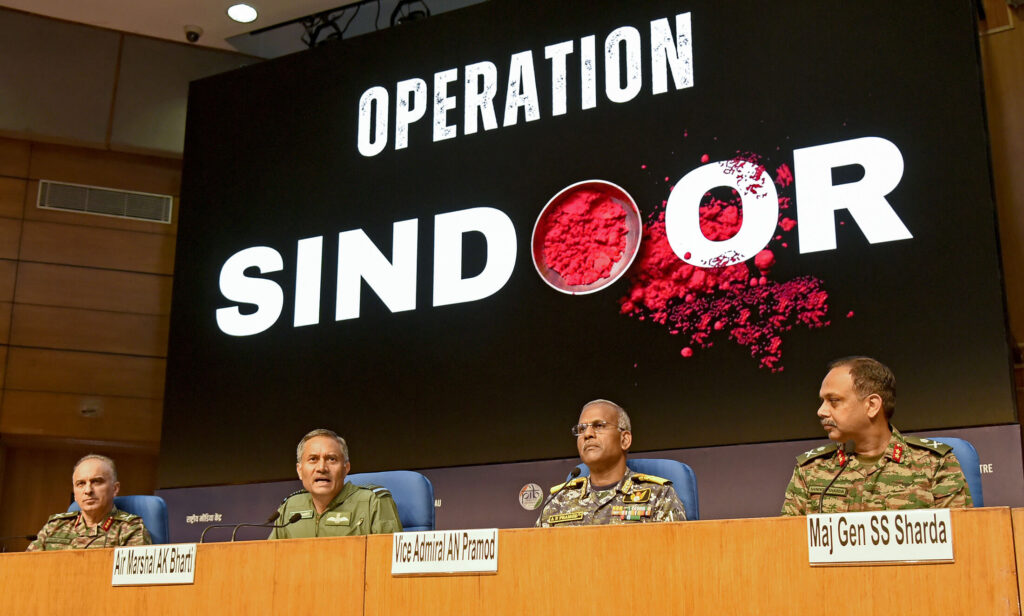
In the aftermath of Operation Sindoor, Prime Minister Narendra Modi has delivered a message that resounds from the icy heights of the LoC to the corridors of global diplomacy: India will no longer tolerate terrorism — it will eliminate it. It is a strategic doctrine, a declaration, and a decisive turning point in the arc of Indian statecraft. The age of strategic restraint is over. A new Indian normal has begun.
A nation transformed: from endurance to enforcement
For decades, India bore the brunt of state-sponsored terrorism with restraint that was often mistaken for weakness. From the blood-soaked platforms of Mumbai to the remote outposts of Pulwama and Poonch, Indians wept, mourned, rebuilt — but rarely retaliated. Those days are gone. With Operation Sindoor, India has changed the equation. Zero tolerance for terror is no longer a slogan—it is state policy, forged in steel and executed with precision. NATION FIRST is no longer a chant—it is a calibrated doctrine.
This shift is not sudden. It is the culmination of years of investment in capacity, clarity, and conviction. India’s response today is not a knee-jerk reaction; it is a strategic recalibration—mature, deliberate, and devastatingly effective.
The power of Bharat: Indigenous, Integrated, Invincible

The Indian military has come of age, not just as a defender of borders but as an enforcer of peace through strength. Powered by indigenous multi-domain capabilities, it now wields precision, mobility, and lethality in perfect harmony. India is no longer dependent on foreign powers for critical systems. From drones and cyberwarfare to space assets and AI-enabled targeting, Bharat has built a warfighting ecosystem that fuses civil innovation with military excellence.
This is not just about hardware. It is about doctrine. It is about the will to act. And it is about a professional military culture, where national pride and operational prowess converge.
Breaking the nuclear blackmail

Perhaps the most significant psychological shift is this: the myth of Pakistan’s nuclear shield as a deterrent to Indian retaliation has crumbled. For years, Rawalpindi’s generals believed that nuclear posturing would insulate their terror apparatus. Operation Sindoor has destroyed that illusion. India’s message is now unmistakable: Proxy war will invite real war. And while India will choose its time and mode of response, respond it will.
Pakistan’s terror factories—long protected under the umbrella of nuclear ambiguity—are now exposed and vulnerable. The costs of misadventure are rising. The world has seen it. Islamabad cannot pretend otherwise.
Pakistan has a choice — or a consequence

Diplomatic euphemisms are over. India will no longer entertain dialogues diluted by duplicity. No more “talks and terror”, “trade and terror”, or “blood and water” coexisting in the name of peace. India’s only conversation with Pakistan now is about Pakistan-Occupied Kashmir—a territory illegally held, brutally governed, and rightfully ours.
This is not sabre-rattling; it is a sovereign stance. India has drawn its red lines—in blood, if necessary—and expects the global community to respect and internalize them. Those who speak of restraint must also speak of justice. Those who speak of peace must also condemn provocation. The burden of change lies with Pakistan. India has already moved on.
A new normal, a new doctrine

Terrorism equals war. That is the new Indian doctrine. It is unambiguous and assured in its punitive posture. Whether the world accepts it or not, the cost of terrorism has been redefined. Terrorists will not find sanctuaries, and their handlers will not find impunity.
The global community must recalibrate. For too long, the indulgence of Pakistan’s duplicity has only emboldened extremism. India’s shift is a wake-up call—not just to Islamabad, but to every capital that looked away while terror festered. This is a strategic shift, not strategic signalling.
The military campaign may be momentarily paused, but this is not a ceasefire—it is a cessation of hostilities, conditional and closely monitored. India remains alert, vigilant, and prepared. Every movement is watched. Every provocation is anticipated and will be responded fiercely . This is a pause for recalibration, not reconciliation.
India’s message: peace through strength

At the heart of this transformation is national resolve. From every farmer in Punjab to every software engineer in Bangalore, from the soldier on the front to the policymaker in Delhi, India has unified behind one principle: We will not live in fear. We will live with pride. The country that once absorbed terrorism now rejects it—violently if required.
This is the dawn of a new Indian normal. Not belligerent. But unapologetic. Not reckless. But resolved.
To be Indian today is to be proud—proud of our soldiers, proud of our leadership, and proud of a nation that has finally said: Enough.

